Present Perfect Tense This week, you will learn about the present perfect verb tense You will learn how to use it to form questions, answers, and statements, and you will learn when to use present perfect tense Module Introduction 021 Present Perfect Overview Lecture 849 Past Participles Lecture 518 When to use Present Perfect ExperiencesExperiences that happened in the past, are still 'with you' today and may happen again in the futureI've been to Asia 3 times nowShe's been to Georgia many timesMy friend broke his arm twice during basketball games à hopefully it won't happen againOngoing thingsActions that started in the past andThe present perfect tense is used when talking about experiences from the past, a change or a situation that has happened in the past but is still continuing today This tense is an important part of English grammar since it demonstrates that actions or events in the past have an effect on the present situation

The Present Perfect Tense Made Easy
To be present perfect tense
To be present perfect tense-The Present Perfect Tense ähnliche App erstellen Kopie dieser App erstellen neue leere App mit dieser Vorlage erstellen weitere Apps mit dieser Vorlage anzeigen merken in "Meine Apps" The Present Perfect Tense 37 (from 10 to 50) based on 3 ratings QRCode Über diese App The present perfect tense of a verb is formed using the helping verb "have" or "has" and the past participle form of the verb Choose "have" if
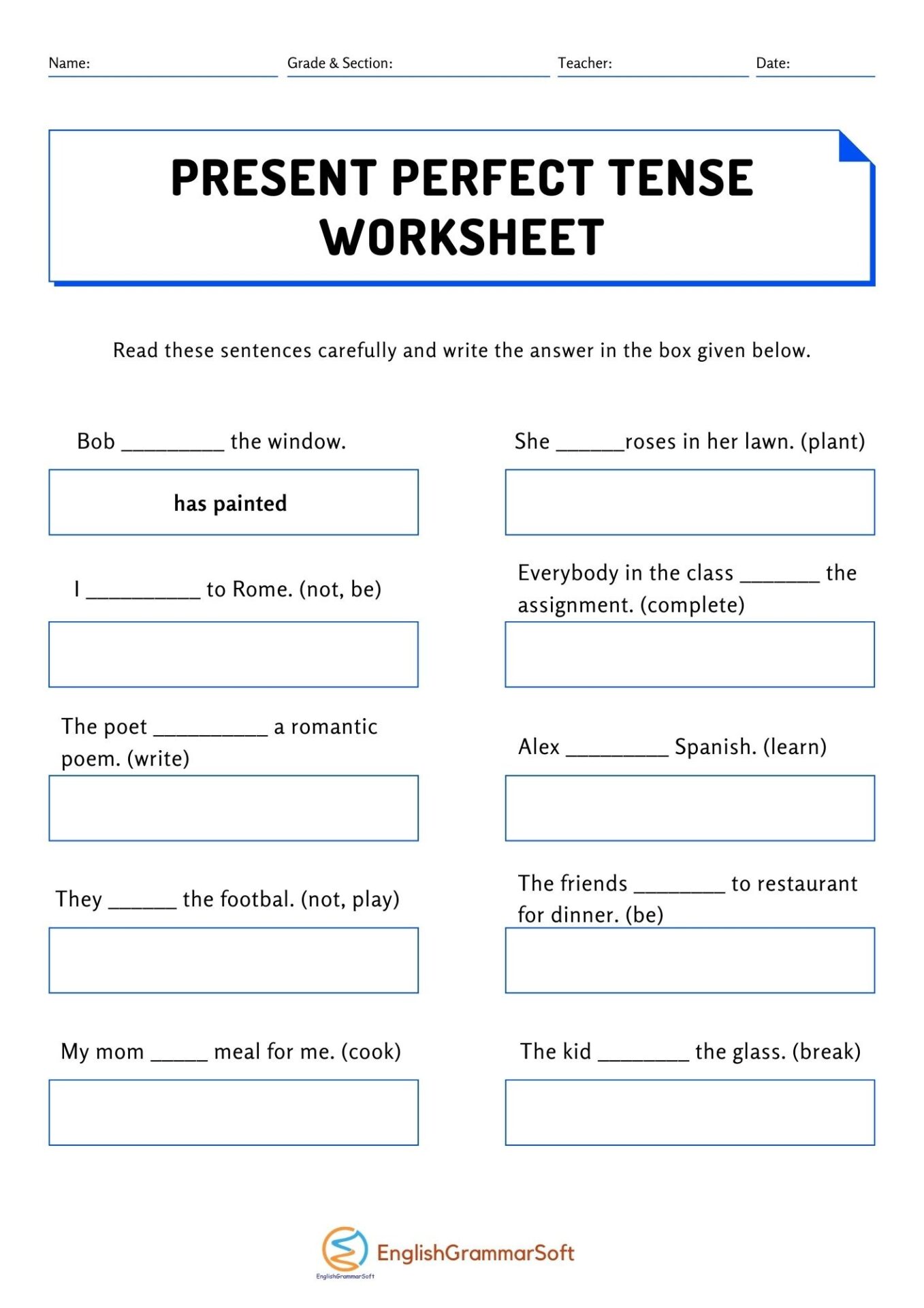



Present Perfect Tense Worksheets With Answers Englishgrammarsoft
The present perfect tense describes an action that began in the past (despite being a present tense) For example John has taken Sarah's advice They have fixed the fence Often, the action being described is still continuing into the present (eg, John continues to take Sarah's advice) This is how the present perfect tense differs from thePresent Perfect Tense The present perfect tense is a tense used in present to indicate the action that has taken place at some specific time It uses auxiliary verb and past participle for the main verb ie verb ed Some examples of present perfect tense are – I have watched this movie before, He has completed his homework5 We can also use the present perfect to talk about something that happened recently, even if there isn't a clear result in the present This is common when we want to introduce news and we often use the words 'just / yet / already / recently' However, the past simple is also correct in these cases, especially in US English
The present perfect tense refers to an action or state that either occurred at an indefinite time in the past (eg, we have talked before) or began in the past and continued to the present time (eg, he has grown impatient over the last hour) This tense is formed by have/has the past participle Note that even in the indicative—or simple—present tense, the verb changes in the first, second, and thirdperson uses To Be Present Perfect The present perfect , formed by combining has or have with a past participle —usually a verb ending in d, ed , or n— indicates actions or events that have been completed or have happened in the presentStructureSubject have/has main verb (past
Erläuterungen Present Perfect (Kurzübersicht) be, do, have im Present Perfect Bildung von Sätzen im Present Perfect Fragen im Present Perfect Grafische Darstellung des Present Perfect Kurzformen und Langformen im Present Perfect Schreibweise der Verben im Present Perfect Signalwörter im Present PerfectDas Present Perfect Continuous ist eine Verlaufsform der Vergangenheit Man verwendet sie zum Beispiel um die Dauer einer Handlung in der Vergangenheit darzustellenThe present perfect tense expresses actions that happened at time that is not specific and actions that started in the past but continue to the present To form the present perfect Subject has/have past participle of verb




Present Perfect Tense Examples Forms And Uses The Learner S Nook




Present Perfect Tense With Examples Definition And More
In summary, the present perfect tense is formed by Subject has/have past participle of verb used to express actions of duration that occurred in the past (before now) of unspecified time used to express actions that started in the past but continue to the present used to express actions that started in the past but stopped recently6 Shall we play tennis?Present Perfect Tense The Present Perfect tense is a rather important tense in English, but it gives speakers of some languages a difficult time That is because it uses concepts or ideas that do not exist in those languages In fact, the structure of the Present Perfect is very simple



1
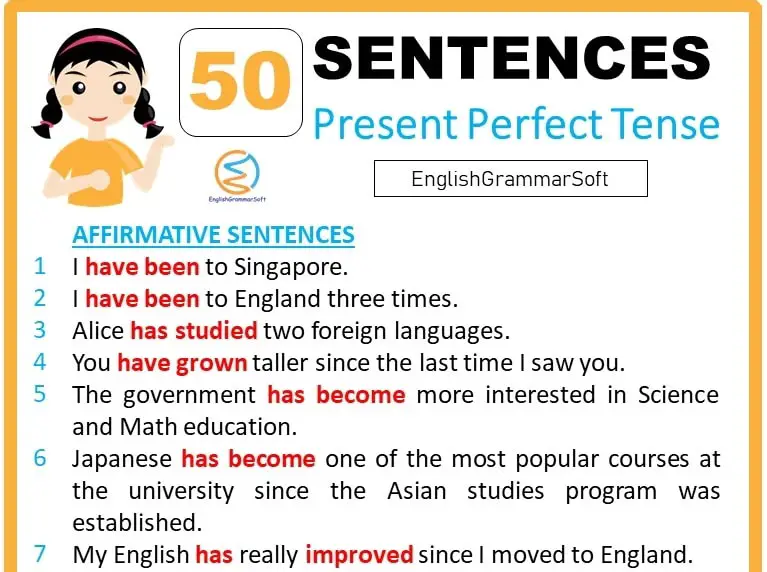



Present Perfect Tense Sentences Affirmative Negative Interrogative 50 Examples Englishgrammarsoft
Present Perfect Tense Form The present perfect tense always has two parts have or has and the past participle ("third form") of the verb I have been / done / gone / seen, etc you have been / done / gone / seen, etc The present perfect tense may refer to things that happened in the past, but they normally continue into the present, or refer to a present reality, such as in the case of something that has happened several times present perfect is a tenses that describe actions occurring starting in the past that ended already but have some continued effect on the present time This may be the most difficult to use verb form since it is not actually used to describe actions occurring in the present time




Present Perfect Tense Definition Useful Examples And Exercise Esl Grammar



1
Bei folgenden Signalwörtern verwenden wir die Present Perfect Simple this week/month/year, today, up to now, just, yet, already, for, ever, never, since, recently, lately, so far, up to now, not yet, etc zB It has just rained b) um zu betonen, dass jemand etwas schon gemacht hat zBLiczba wyników dla zapytania 'present perfect to be' Past simple VS Present Perfect Twierdzenia HARD Test wg MotywujacyanglistaSIMPLE present simple or past simple except future will be I was I am I will beI was not I am not I will not be?




Mind Map The Present Perfect Tense English




Advanced Learner S English Grammar Present Perfect Tense
Exercise on Present Perfect Simple Put the verbs into the correct form (present perfect simple) I (not / work) today We (buy) a new lamp We (not / plan) our holiday yet Where (be / you) ?(opens new tab) I will be present participle you will be present participle he/she/it will be present participle we will be present participle you will be present participle they will be present participle Future Perfect Tense The future perfect tense is used to describe an action that will have been completed at some point in the future We know Spanish tenses are plentiful and complicated They all take some time to learn, which is why, in this article, we'll be focusing on one particular form that didn't get much attention yet the pretérito perfecto compuesto, antepresente or present perfect This indicative mood tense is used to talk about the past and, below, we'll go over how to form the present perfect
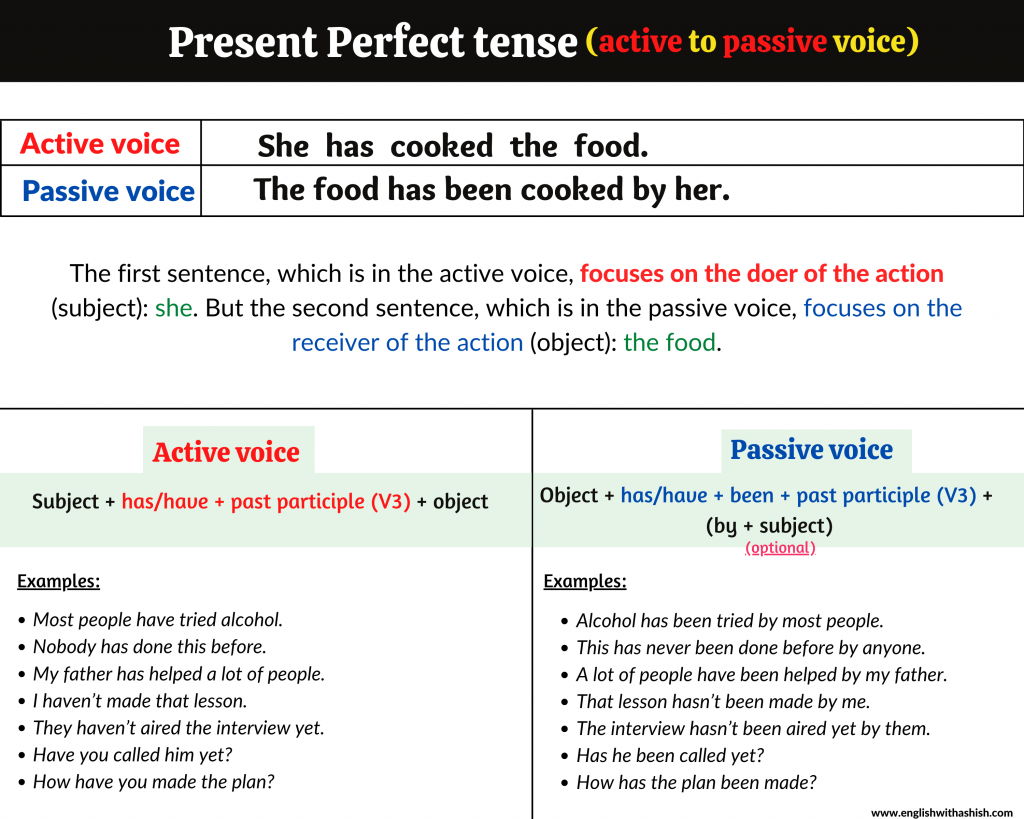



Active Voice To Passive Voice In Present Perfect Tense Examples And Practice Set
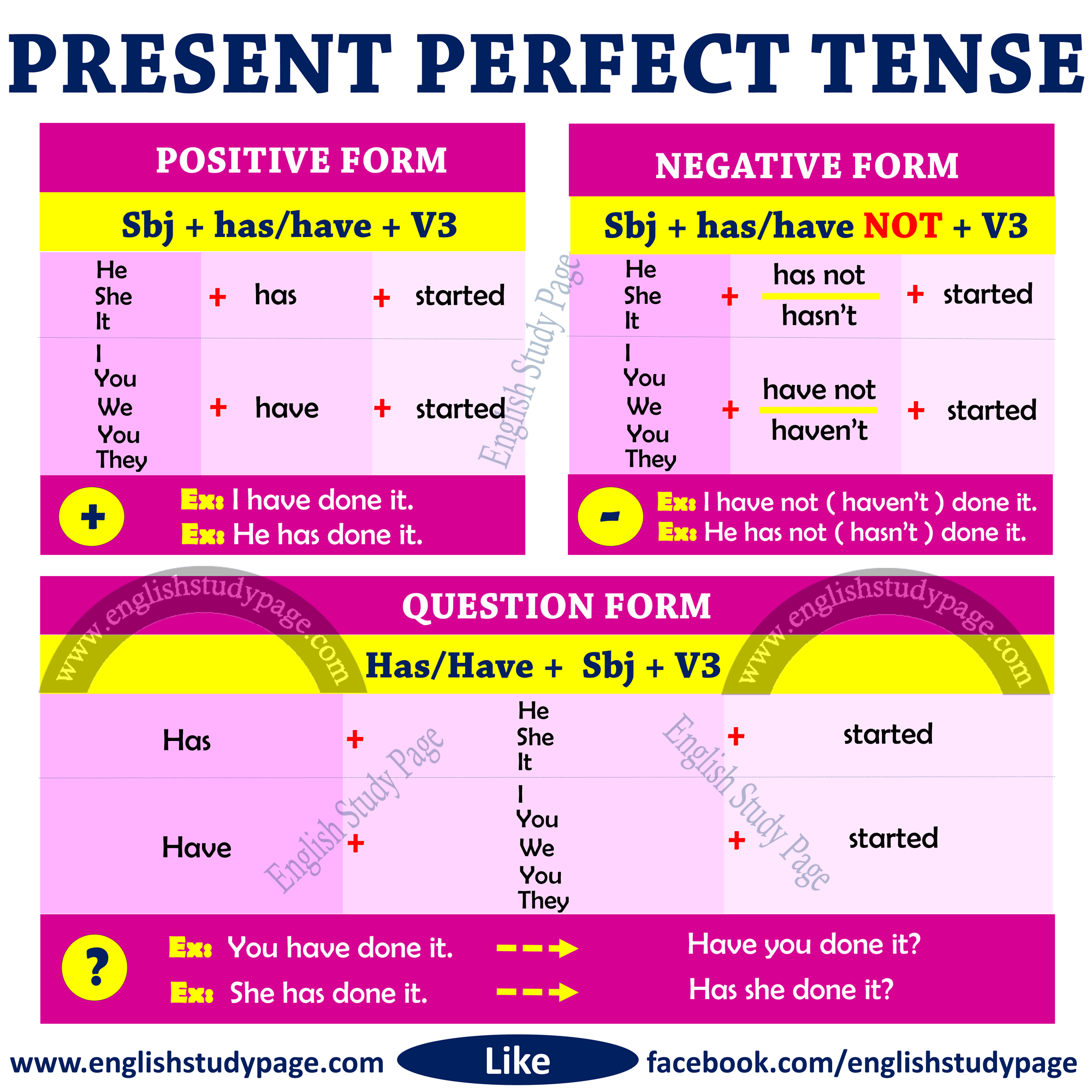



Structure Of Present Perfect Tense English Study Page
The Present Tense – Present Perfect Answers Directions Complete the following sentences in the present perfect simple tense 1) She has been (to be) happy all day 2) It has always snowed (to snow) here in December 3) Dan has been (to be) sick for three days 4) Li and Susan have tried (to try) four times already and will not give up The Present Perfect is a very important tense in English, as you've probably already seen It's used in a variety of ways, which means it can take some time for English students to become familiar with itPRESENT PERFECT TENSE The present perfect is a verb tense which is used to show that an action has taken place once or many times before now The present perfect is most frequently used to talk about experiences or changes that have
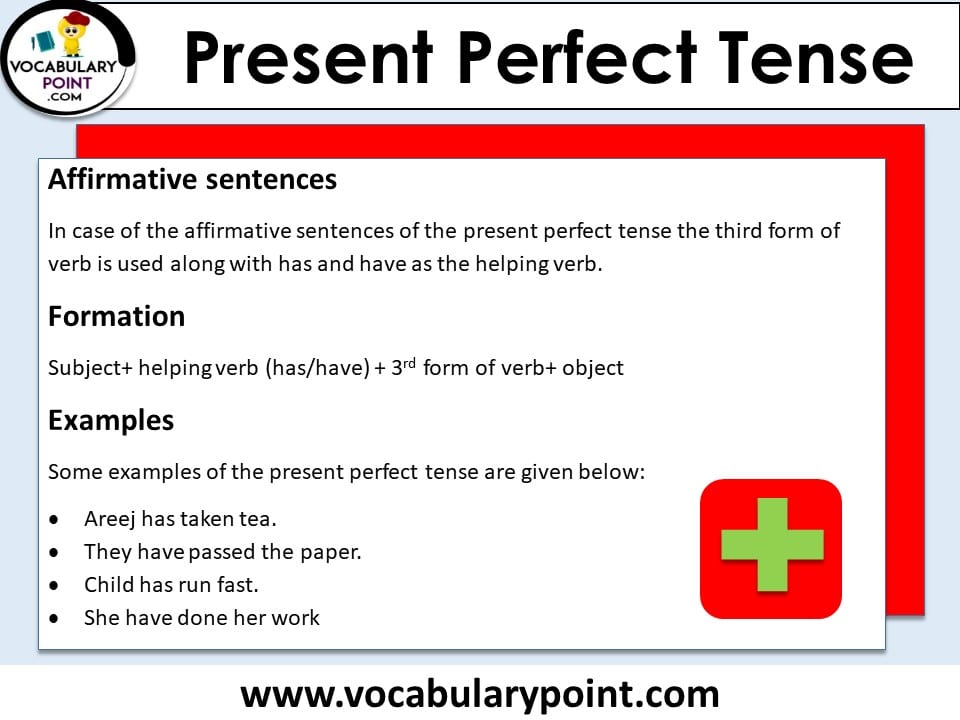



Present Perfect Tense Examples Sentences Formation Vocabulary Point




Present Perfect Tense Definition Useful Examples And Exercise Esl Grammar
The perfect tense consists of the present tense of the verb ha (to have) the supine form of the main verb As in English, you get the past perfect by using the imperfect form of ha instead of the present tense onlineswedishcom onlineswedishcom Im Unterschied zur deutschen Grammatik,PERFECT have been I had been I have beenPresent Perfect Simple Mehr zum Thema Present Perfect Simple findest du auch auf unserer neuen Seite zum EnglischLernen Lingolia Im Deutschen nennen wir diese Zeitform Perfekt oder vollendete Gegenwart Sie drückt aus, dass eine Handlung vor kurzem stattfand und noch Einfluss auf die Gegenwart hat




Present Perfect Tense Definition Examples Rules Onlymyenglish
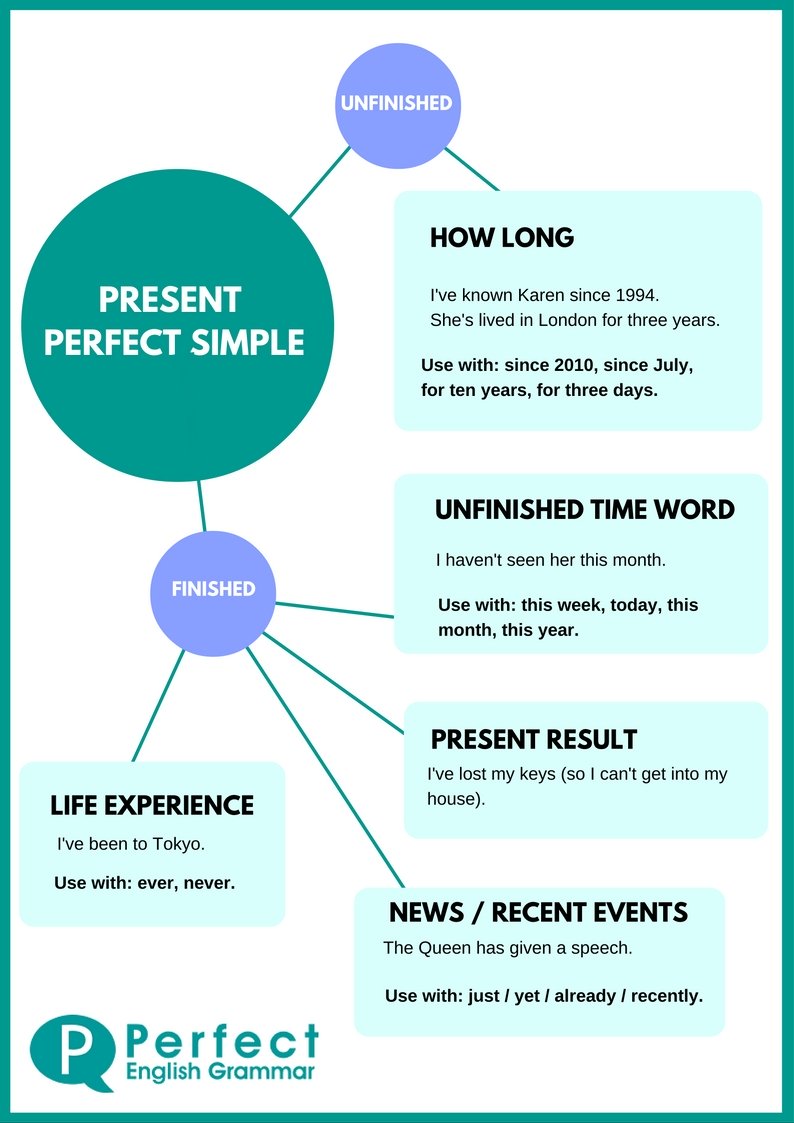



Using The Present Perfect Tense In English
To make the positive present perfect tense, use 'have' / 'has' the past participle Make the past participle by adding 'ed' to regular verbs (for example, 'play' becomes 'played') There are a few verbs that change their spelling when you add 'ed' (for example, 'study' becomes 'studied') We also have some completely irregular verbsDas Present Perfect bildet man mit have / has Past Participle (3 Form, Partizip) Endet das Verb auf einem unbetontem e, wird nur d angehängt Setze das Present Perfect von 'to live' ein I live in London (Simple Present) I has have lived has have lived Present perfect tense is for actions that happened in the past and also have a connection to the present or future Learn when to use present perfect tense
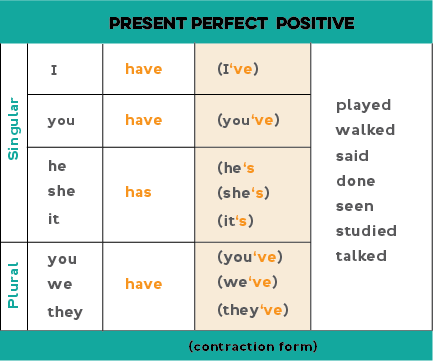



Present Perfect In English
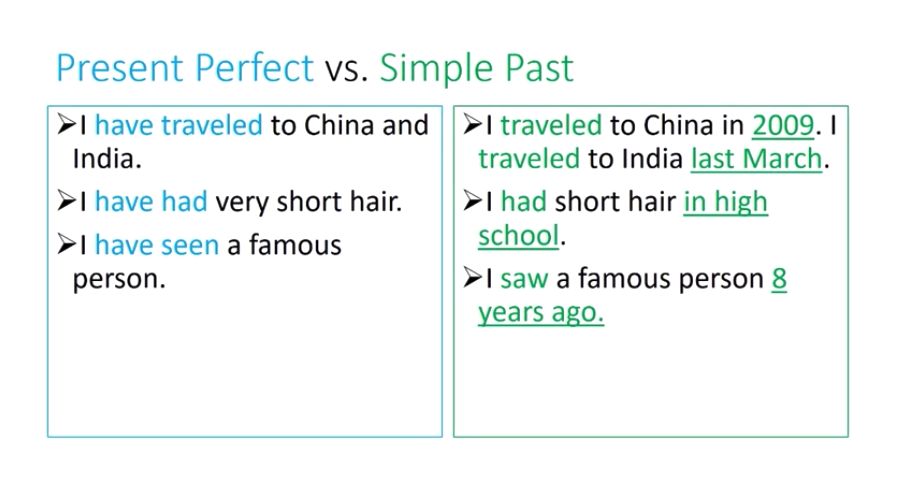



Present Perfect Tense Asean Scholarships
CONTINUOUS be being I was being I am being I will be beingI was not being I am not being I will not be being?TENSES T 24 wwwenglishgrammatat Past or Present Perfect Tense – Simple form 1 The weather has been awful in the past few days 2 We have washed the dishes They're clean now 3 Has your course started yet? The present perfect tense is formed by combining the word have/has with the past participle in order to express an action that began in the past and is now completed in the present In this case, the word has is paired with the past participle read, creating a sentence that uses the present perfect tense
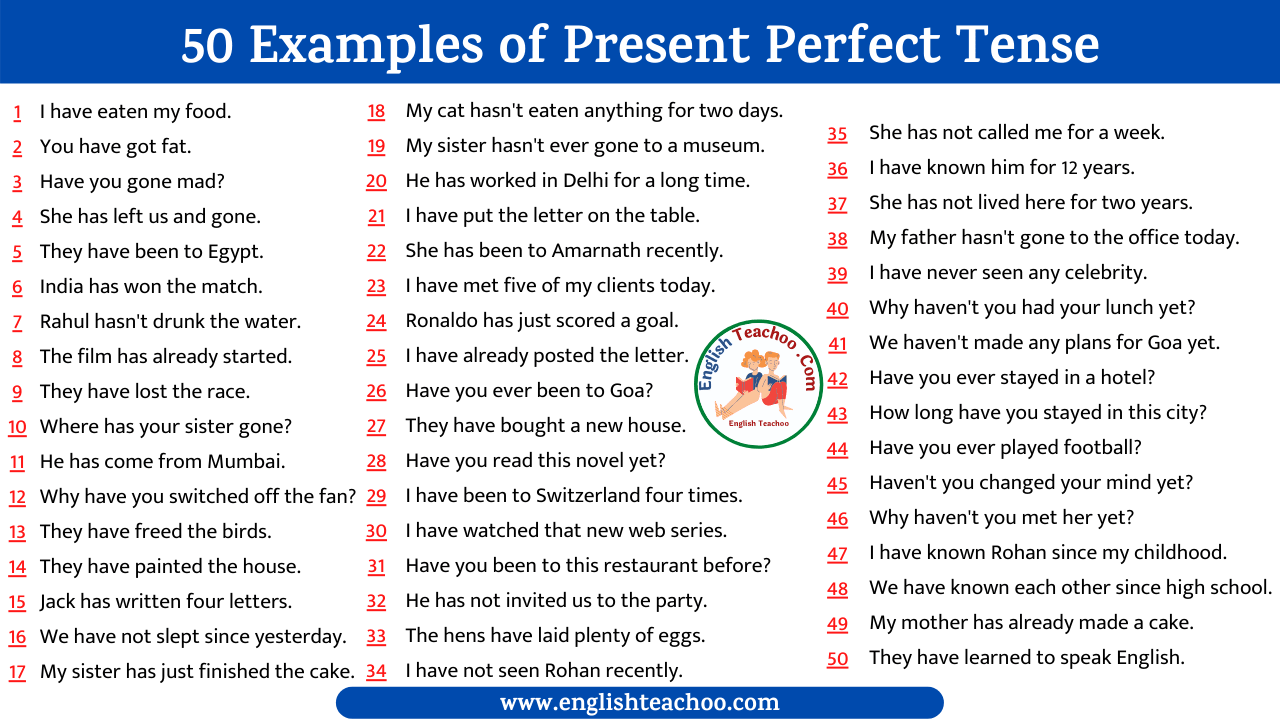



Present Perfect Tense Examples Englishteachoo




Test English Prepare For Your English Exam
When did that happen?This lesson is an overview of the present perfect tense What it looks like, how to use it and when to use it! When using the present perfect tense, you need an auxiliary verb that helps your main verb to function In the perfect tenses, the verb (to) have is always the auxiliary verb In the present perfect tense, the main verb is in the past participle form This is not difficult for regular past tense verbs




The Present Perfect Tense Basic Rule And Examples Zakcass




Present Perfect Tense Present Perfect Perfect Tense Learn English
Present perfect exercises Present perfect simple in English exercises lower intermediate level esl online4 Emma packed her suitcase last night 5 They have closed the factory – Really?The present perfect tense might be a hard tense for learners of English and students often have a hard time keeping the present perfect tense apart from the




Present Perfect Tense Competitive Exam Preparation Lessons24x7




Using The Present Perfect Tense In English
B1 Past and Present Perfect Tense Simple Form T027 Fill in the correct form of the verb in brackets Past Simple or Present Perfect Simple 1 The weather around here _____ terrible in the last few weeks (BE) 2 Maria _____ her suitcase last night (PACK) 3 I _____ volleyball since I was a teenager (NOT PLAY) 4If we begin with the present perfect "If your passport has expired", then we are talking about a hypothetical in the present, so I would expect "you will (or would) have to renew it" (This is a Type 1 Conditional)ESL Present Perfect Questions Worksheet Reading and Writing Exercises Preintermediate () 30 minutes In this present perfect questions worksheet, students learn the functions of question words and how to form, ask and answer Wh questions in the present perfect tense Give each student a copy of the twopage worksheet
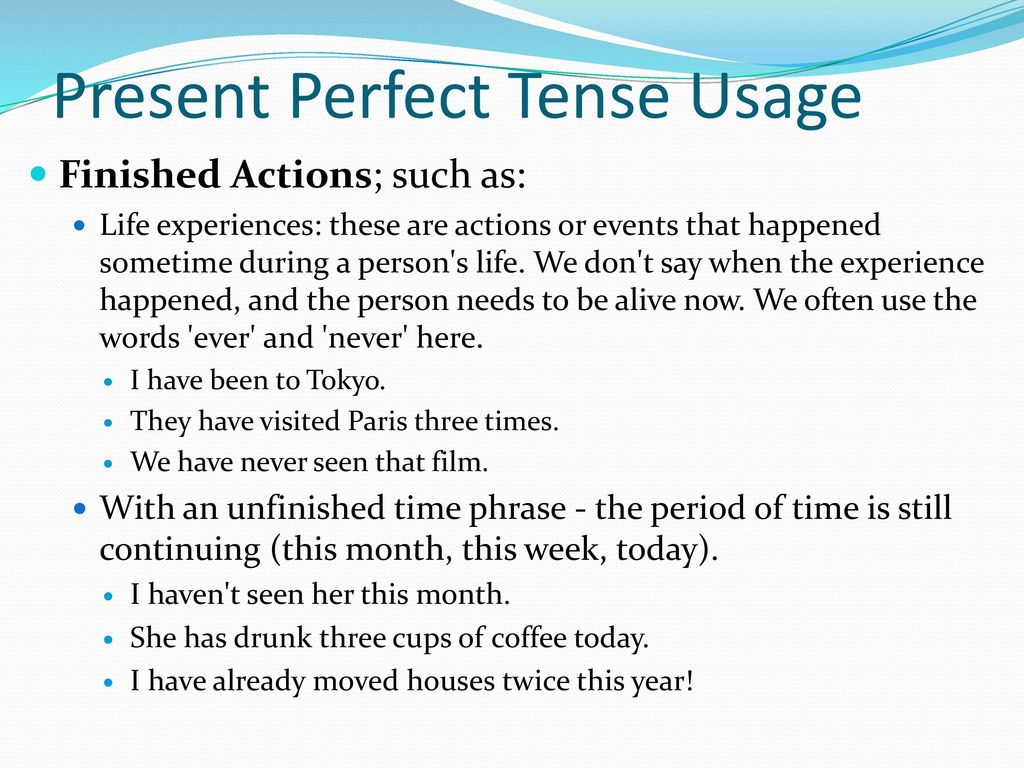



Present Perfect Tense Ppt Download
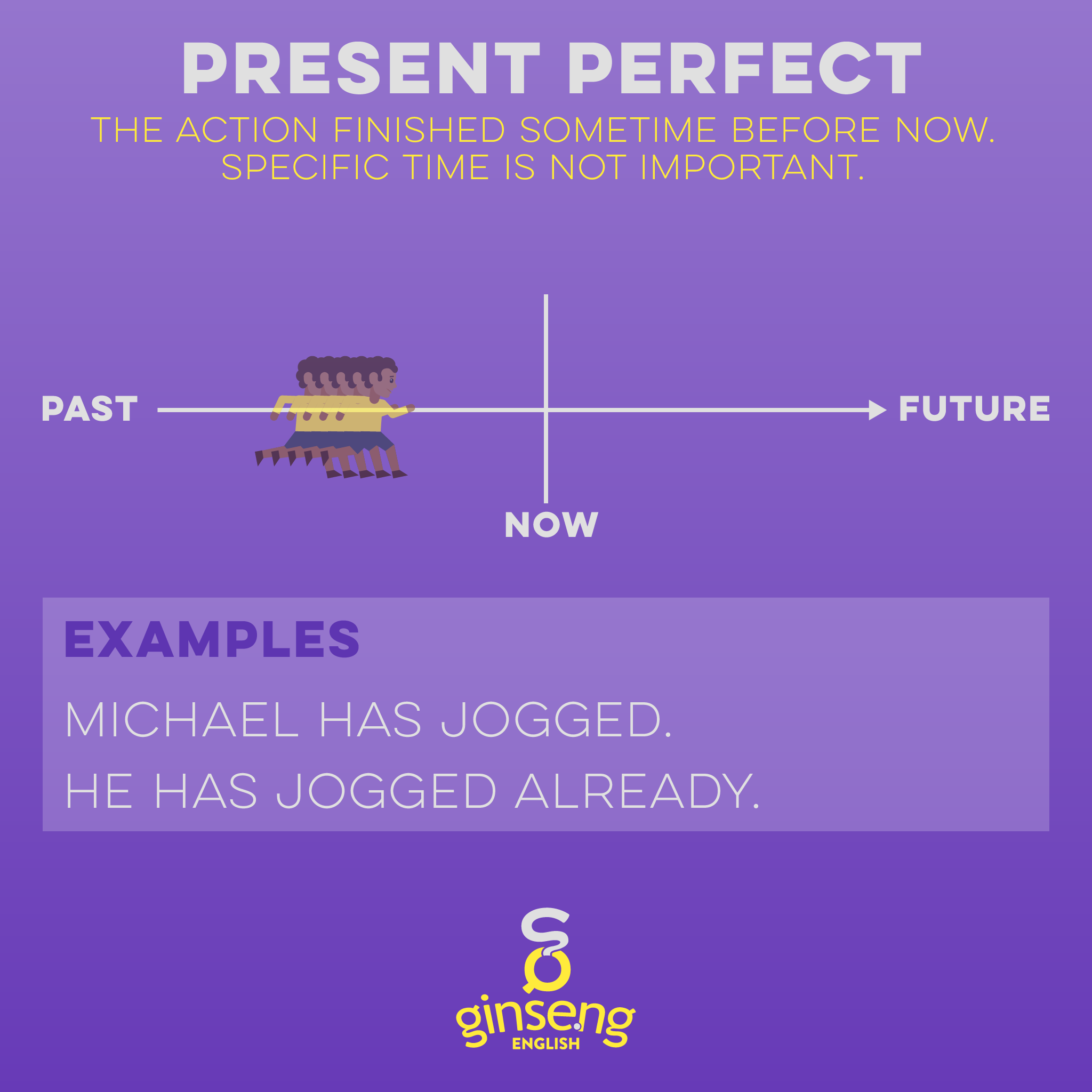



Present Perfect Tense Ginseng English Learn English
TENSES T 25 wwwenglishgrammarat Past or Present Perfect Tense – Simple form 1 The President has just come out of the building and will make a speech in a moment12 tenses (be) past present future;Present Perfect (Summary) be, do, have and irregular verbs in the Present Perfect Diagram of the Present Perfect Form of the Present Perfect Questions in the Present Perfect Short/contracted forms and long forms in the Present Perfect Signal words for the Present Perfect Spelling of verbs in the Present Perfect Use of the Present Perfect
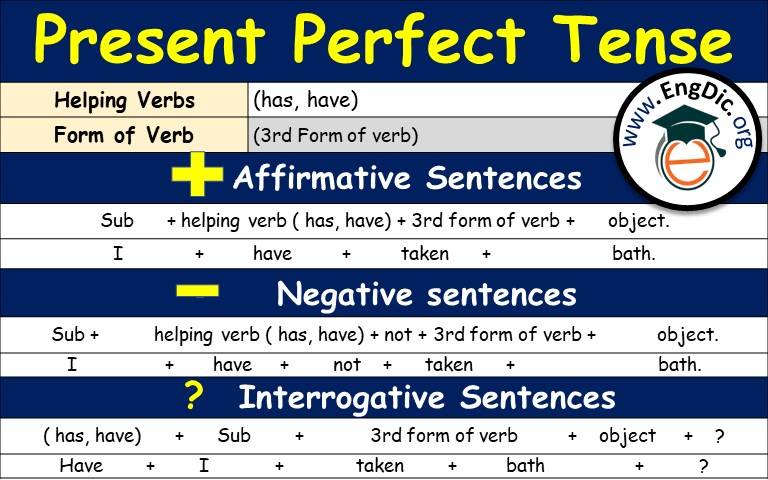



Present Perfect Tense Download Complete Pdf Engdic
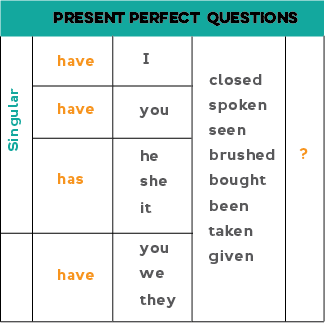



Present Perfect In English
100 Sentences of Present Perfect Tense Examples of Present Perfect Tense 1My sister has already made a big cake 2You have grown since the last time I saw you 3It hasn't drunk the water 4I have seen that movie 5We haven't received any mail since we were retired 6They haven't gone to the shopping center 7Have they played the piano?Will I be being?
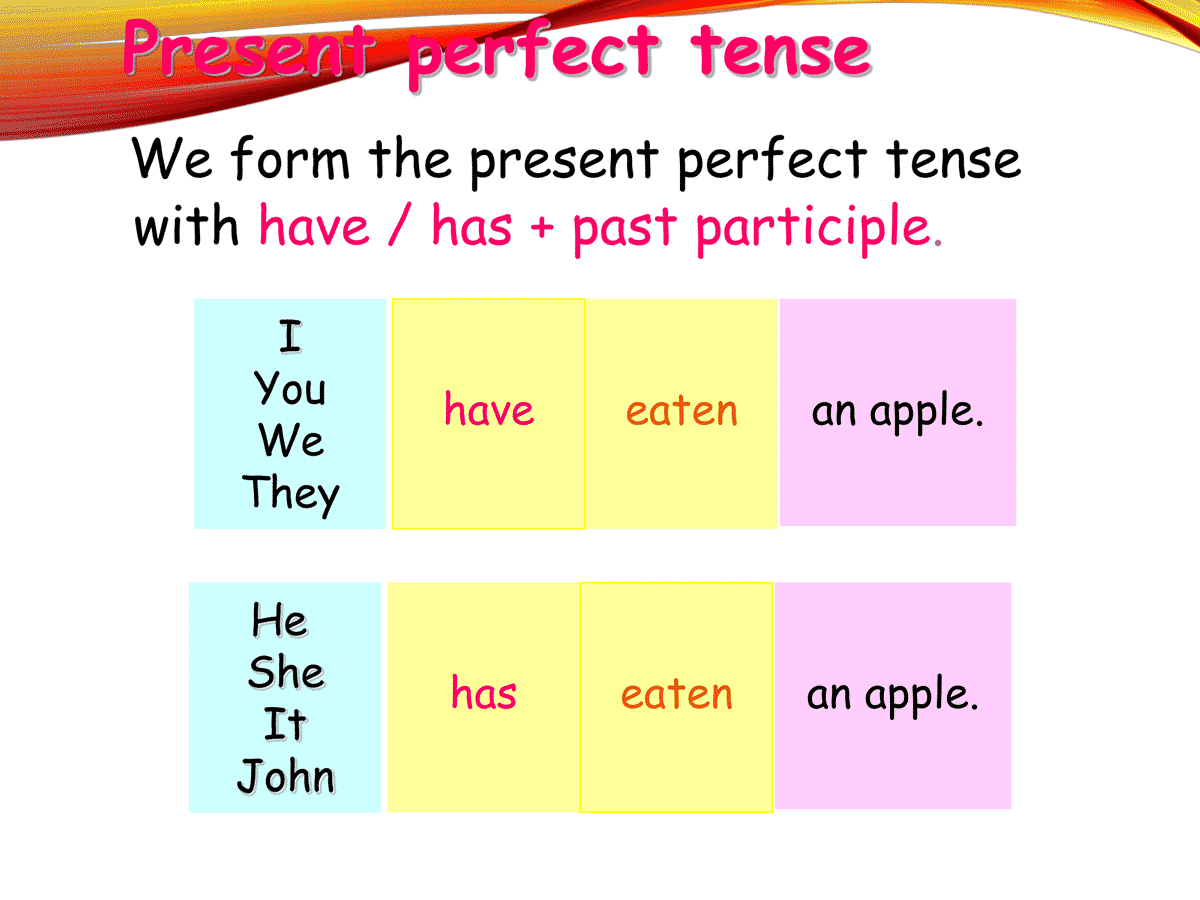



Using The Present Perfect Tense In English Eslbuzz Learning English




The Present Perfect Tense In English Connecting The Past With The Present
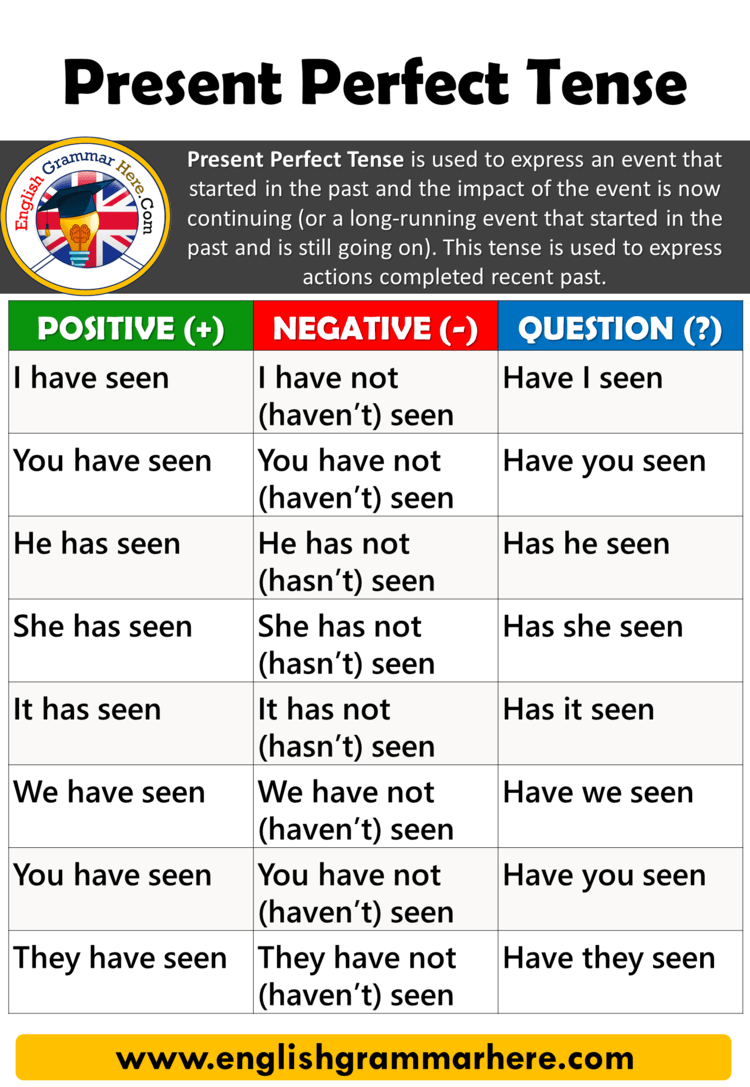



Using The Present Perfect Tense In English English Grammar Here
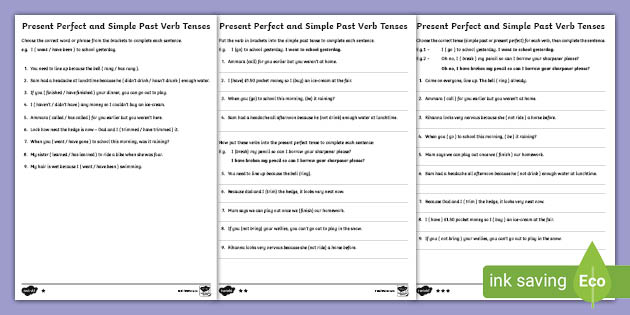



The Past And Present Perfect Form Of Verbs Worksheets
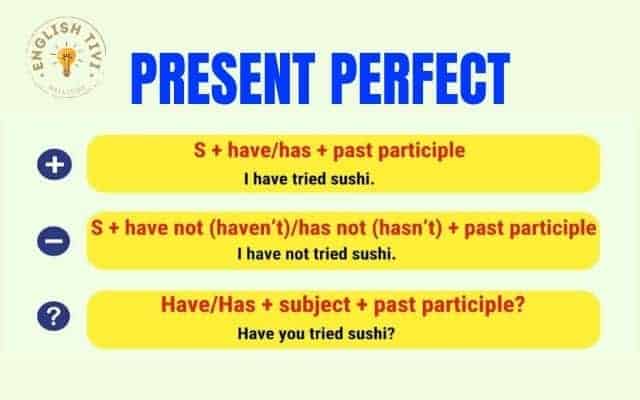



Present Perfect Tense English Grammar Tenses English Tivi



Present Perfect Tense Structure Pdf




What Is Present Perfect Tense Thesaurus Com
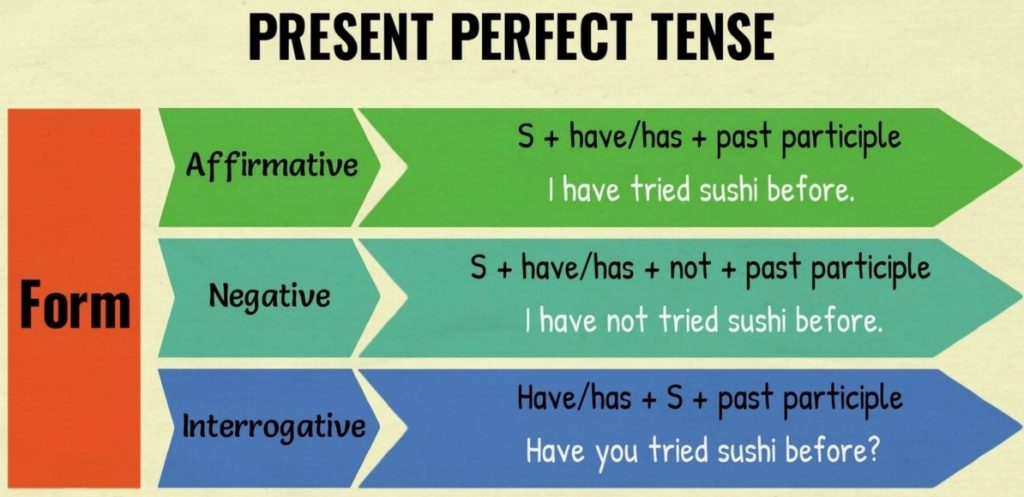



The Present Perfect Tense The Argentinian Problem En Ingles
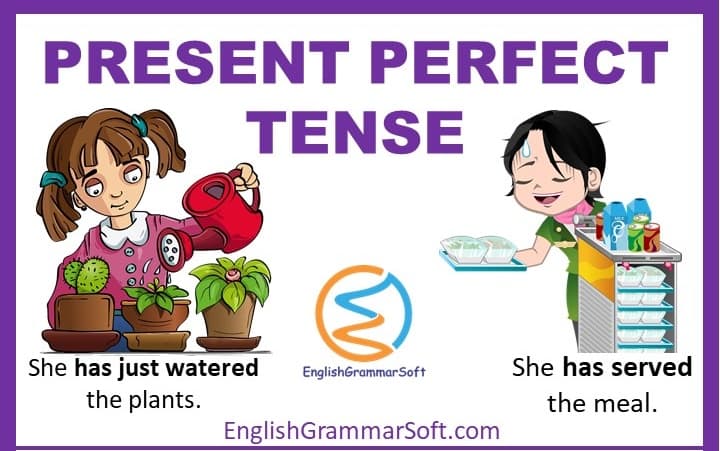



Present Perfect Tense With Examples Englishgrammarsoft




Present Perfect Tense Definition Rules And Useful Examples 7esl
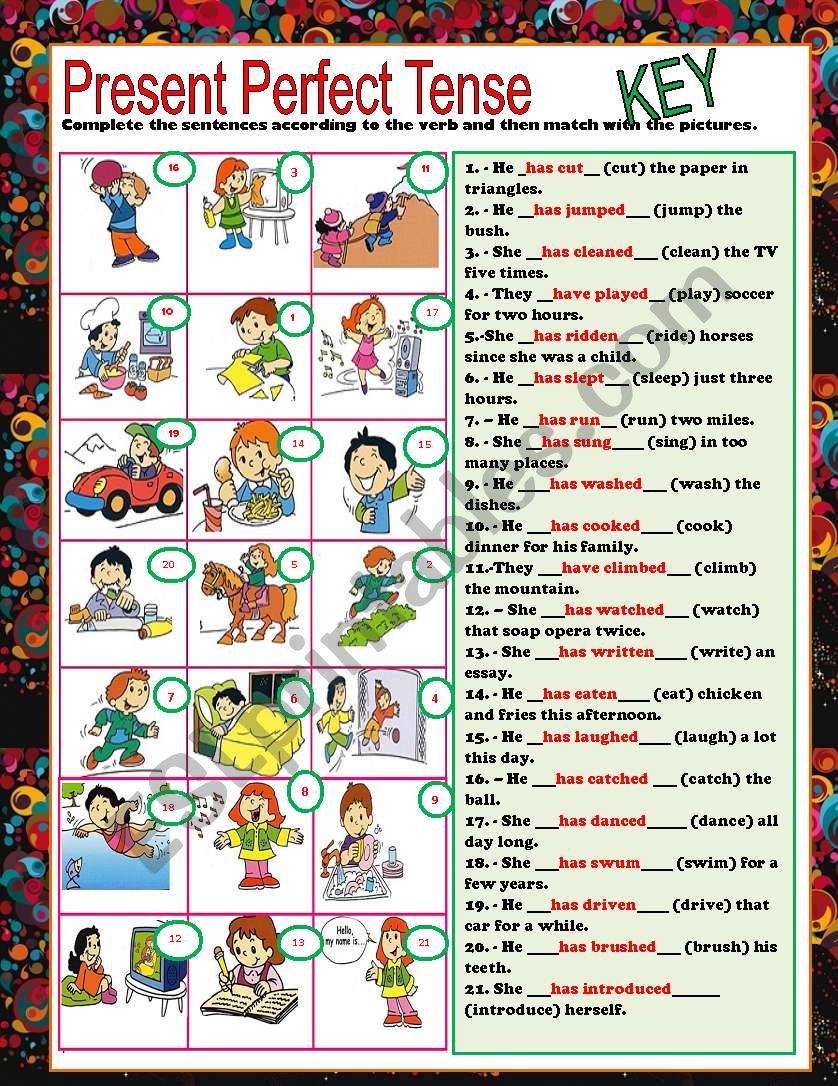



Present Perfect Tense Answer Key Esl Worksheet By Rukiak




Present Perfect Tense Online Activity For High School
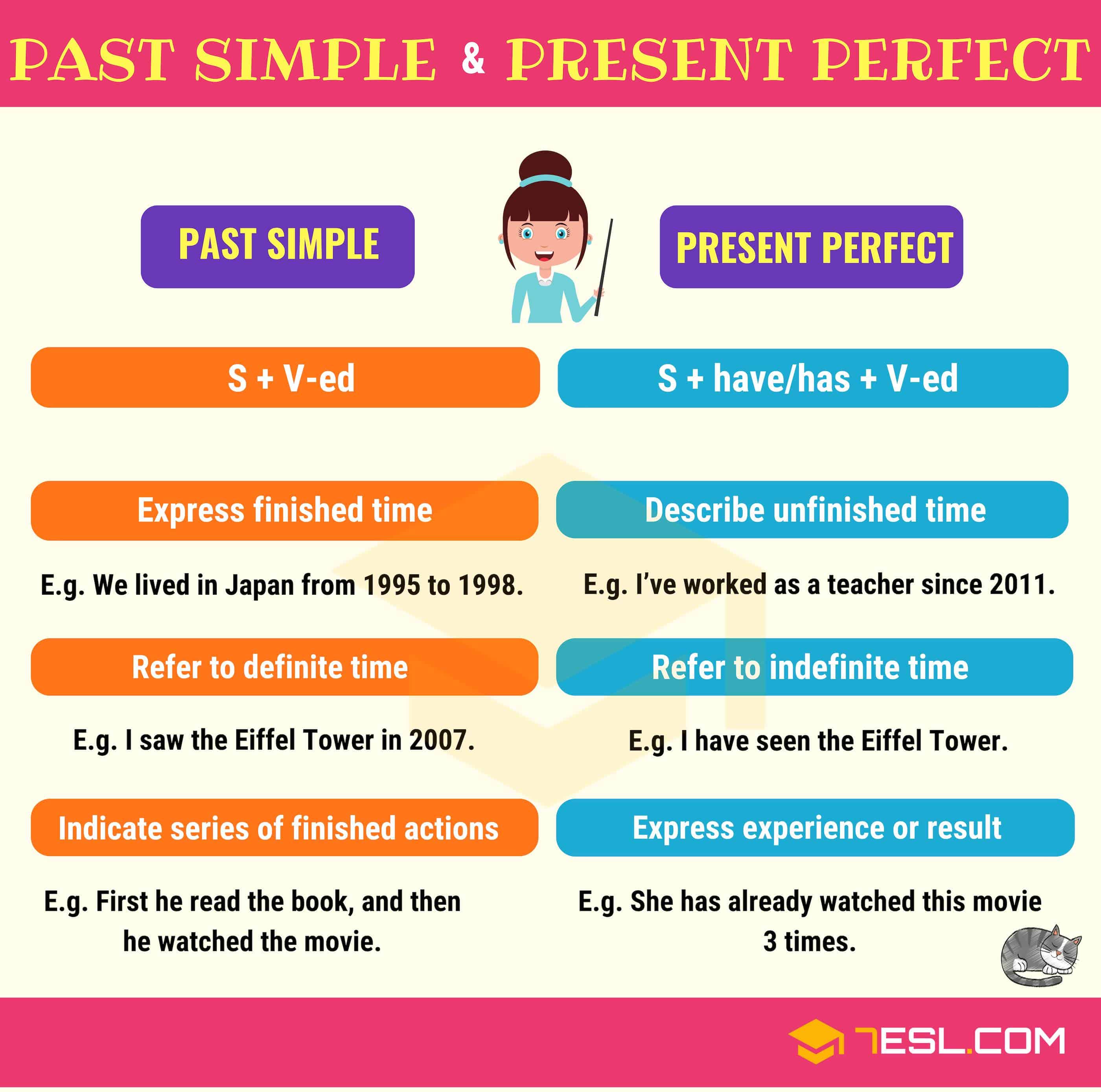



Present Perfect Vs Past Simple Useful Differences 7esl




The Present Perfect Tense Made Easy




Present Perfect Tense With Since And For With Exercise And Examples Present Perfect Tense Youtube




10 Present Perfect Tense Example Sentences English Vocabs




Present Perfect Tense Worksheets With Answers Englishgrammarsoft




Present Perfect Tense Good Examples And Important Uses




Present Perfect Tense Part 1 No 1 Institute



Present Perfect Tense Lessons Blendspace




Present Perfect Tense Exercises With Answers




Present Perfect Tense And Use Of Present Perfect Tense




Present Perfect Tense Since For English Esl Worksheets For Distance Learning And Physical Classrooms
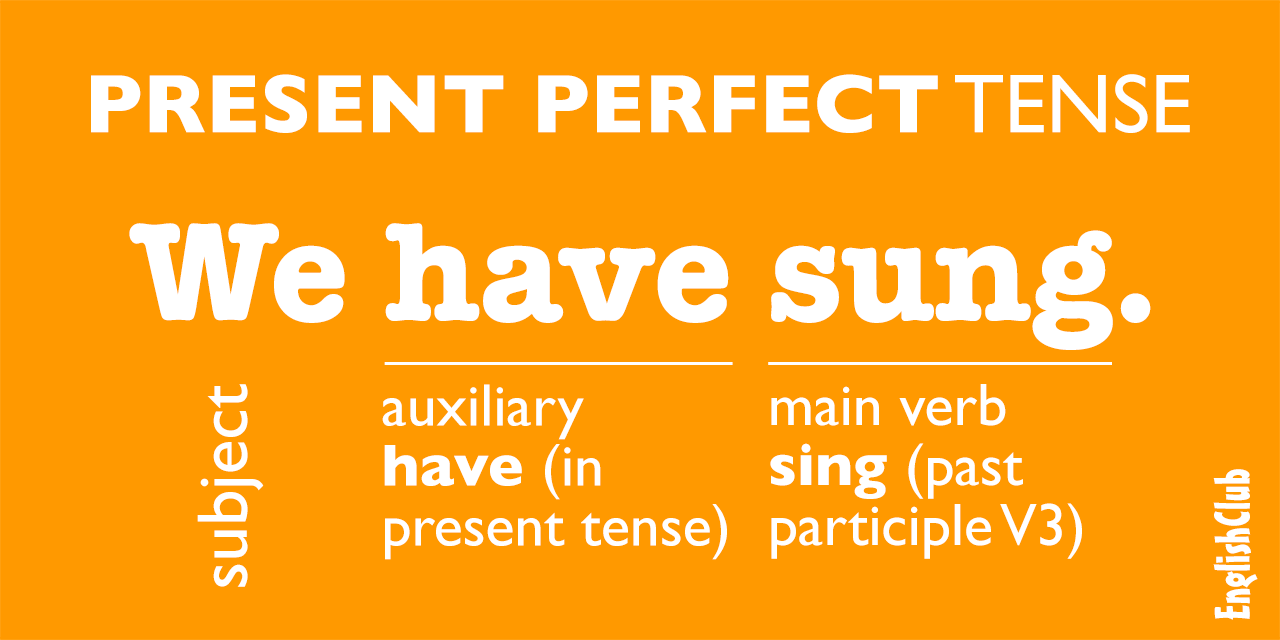



Present Perfect Tense Grammar Englishclub




English Tenses Past Simple And Present Perfect Eslbuzz Learning English




Talk2me English The Present Perfect Tense Simplified




Present Perfect Tense English Grammar English The Easy Way




Present Perfect Tense Practice 2 Worksheet




Present Perfect Tense With Games Exercises Pictures And Examples




Using The Present Perfect Tense In English



Tense Tutorial Present Perfect Worldwide Frontier Llc




Present Perfect Tense Examples Exercise And Usage Examplanning




Present Perfect Tense Vocabulary Home
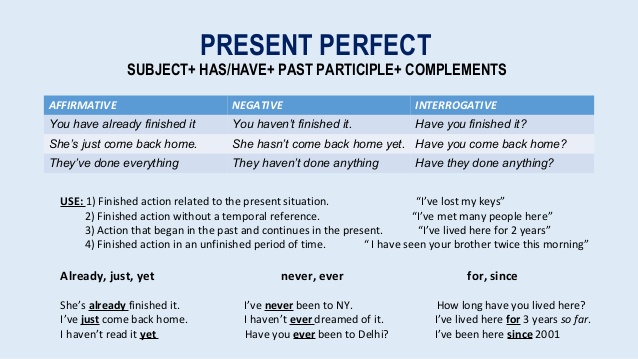



Present Perfect Tense In English English Learn Site




Present Perfect Tense Definition And Examples Structure Of Sentences
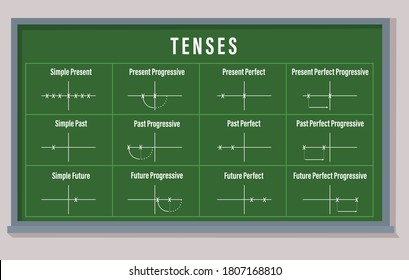



Present Perfect Tense High Res Stock Images Shutterstock




Present Perfect Tense English Study Page




Esl Grammar Introduction To Present Perfect Tense




Test English Prepare For Your English Exam
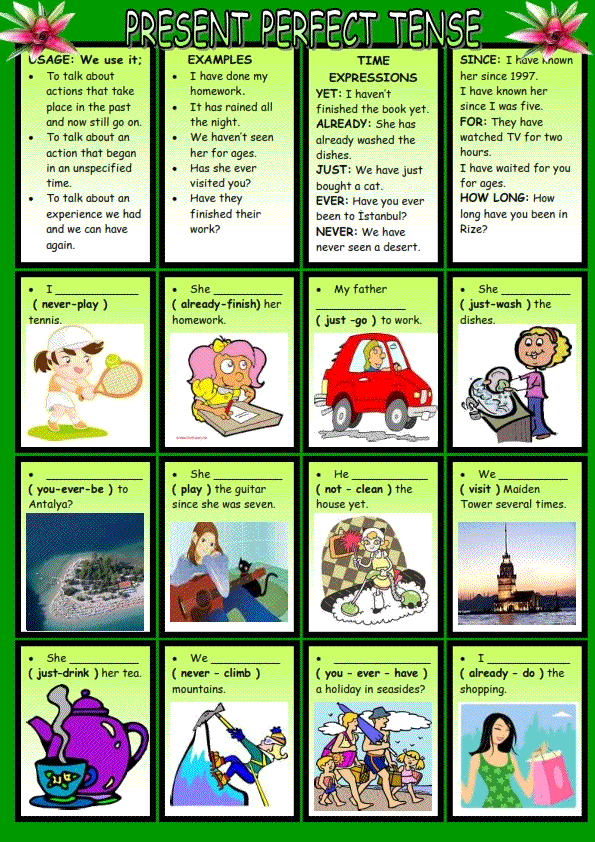



Present Perfect Tense Exercises Free Printable Present Perfect Tense Esl Worksheets




English Short Story The Perfect Present With The Present Perfect Level B1 B2 Learn English With Africa



1




What Is The Present Perfect Tense Definition Examples Of English Tenses Writing Explained




The Present Perfect Tense The Present Perfect Tense Refers To An By Pmcfb Medium




Present Perfect Tense What Is The Present Perfect Tense
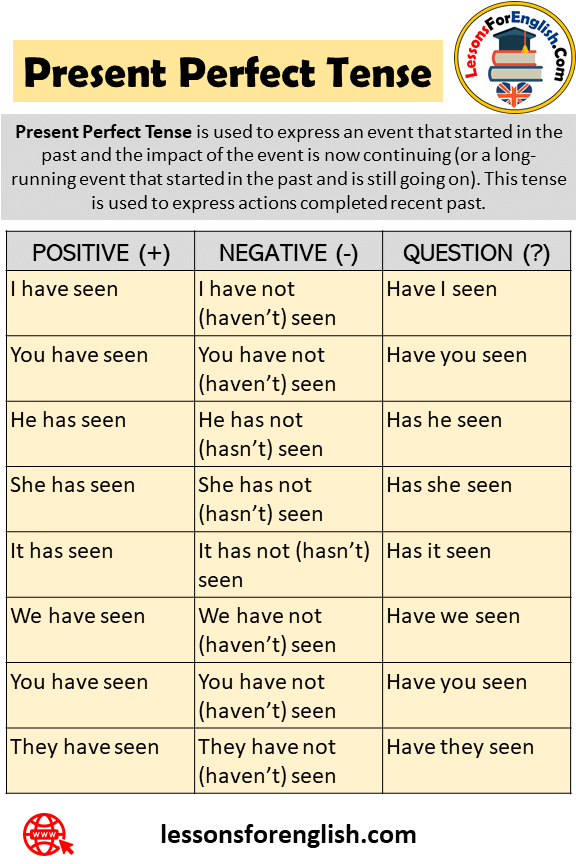



Present Perfect Tenses Definition And Example Sentences Lessons For English




Formation Of Tense With Verb Go In Present Perfect Tense Youtube
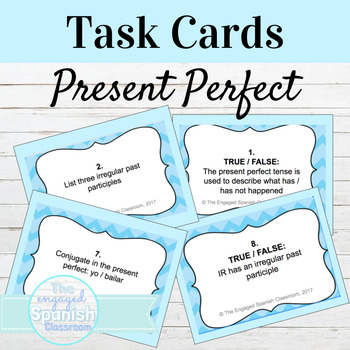



Spanish Present Perfect Tense Task Cards By The Engaged Spanish Classroom




Present Perfect Tense Examples All Four Forms English Grammar Vocabulary




Present Perfect Tense English Esl Worksheets For Distance Learning And Physical Classrooms
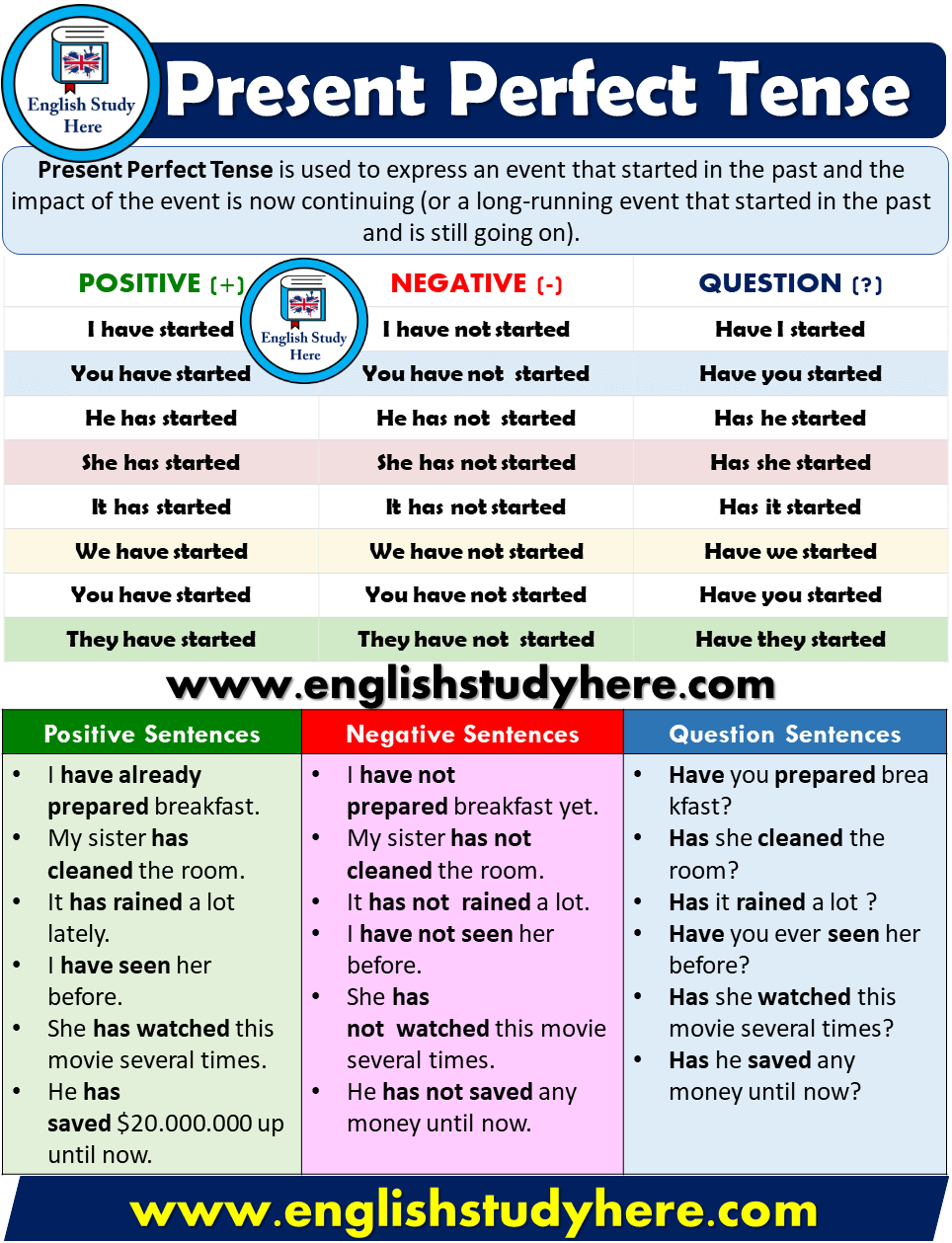



Present Perfect Tense Detailed Expression English Study Here




Topic Present Perfect Tense Lesson Goal Students Will Be Able To Learn And Use Present Perfect Tense Ppt Download



Present Perfect Tense In English English Study Here




Present Perfect Tense
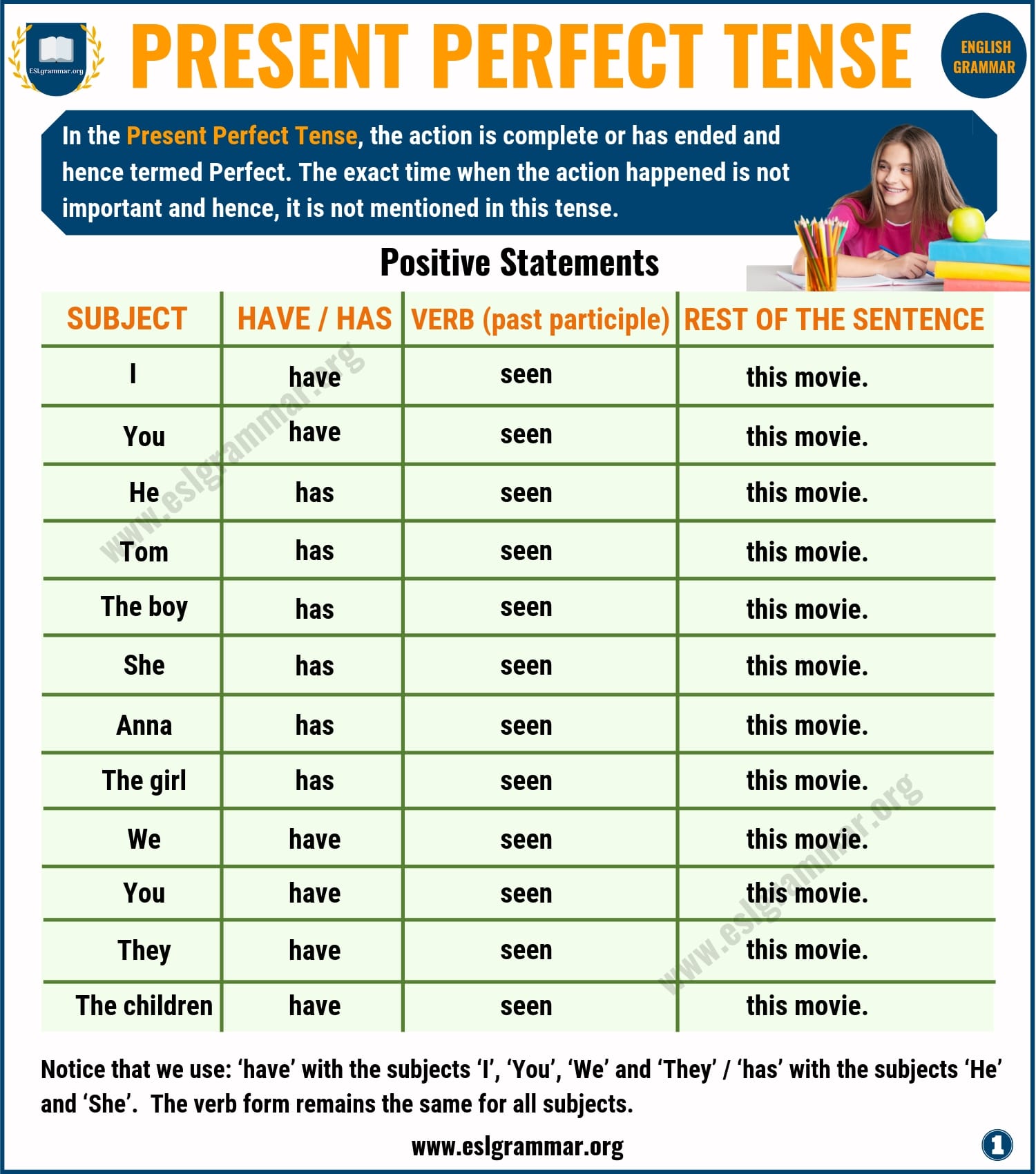



Present Perfect Tense Definition Useful Examples And Exercise Esl Grammar
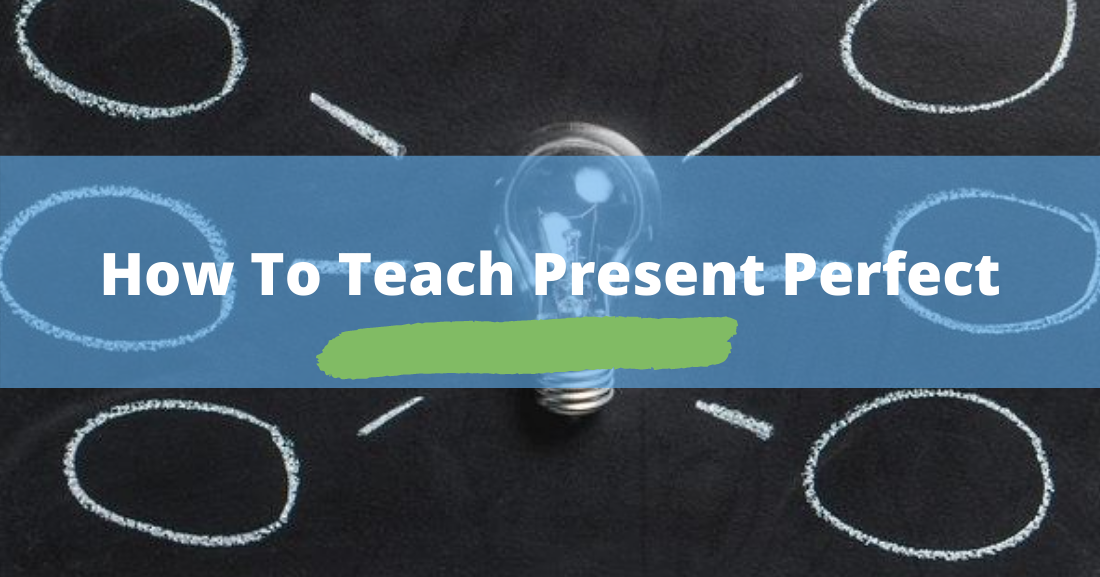



How To Teach Present Perfect Activities And Examples
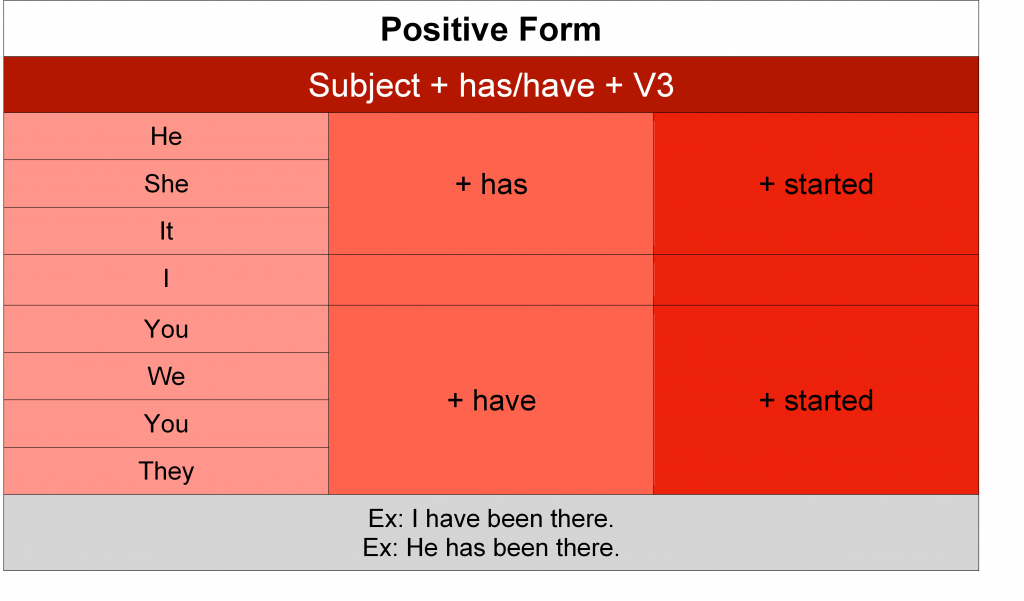



Present Perfect Tense Fun English Grammar Lessons Pocket Passport




Present Perfect Tense Detailed Expression English Study Here
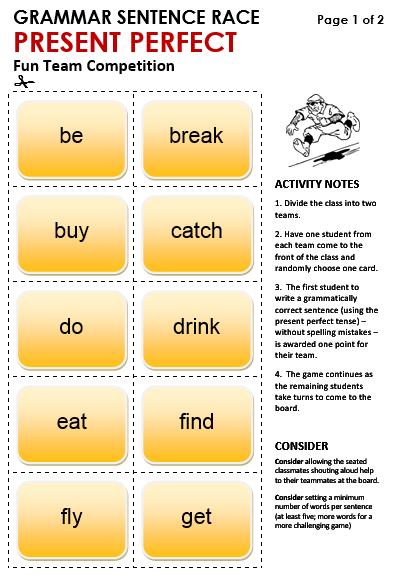



Present Perfect Simple All Things Grammar




The Present Perfect Tense Masterclass In English




Present Perfect Tense Worksheets K5 Learning
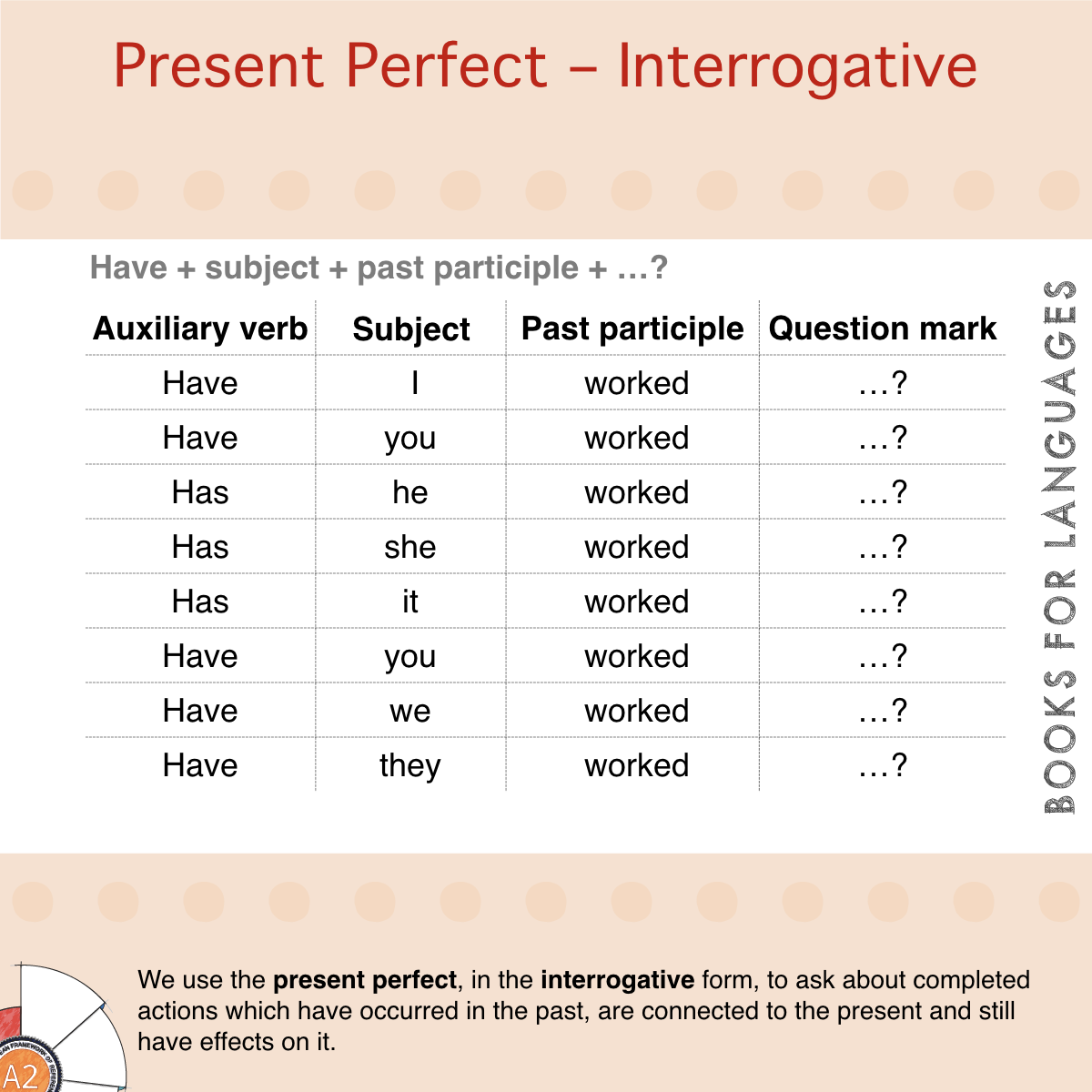



Present Perfect Interrogative English Grammar Level
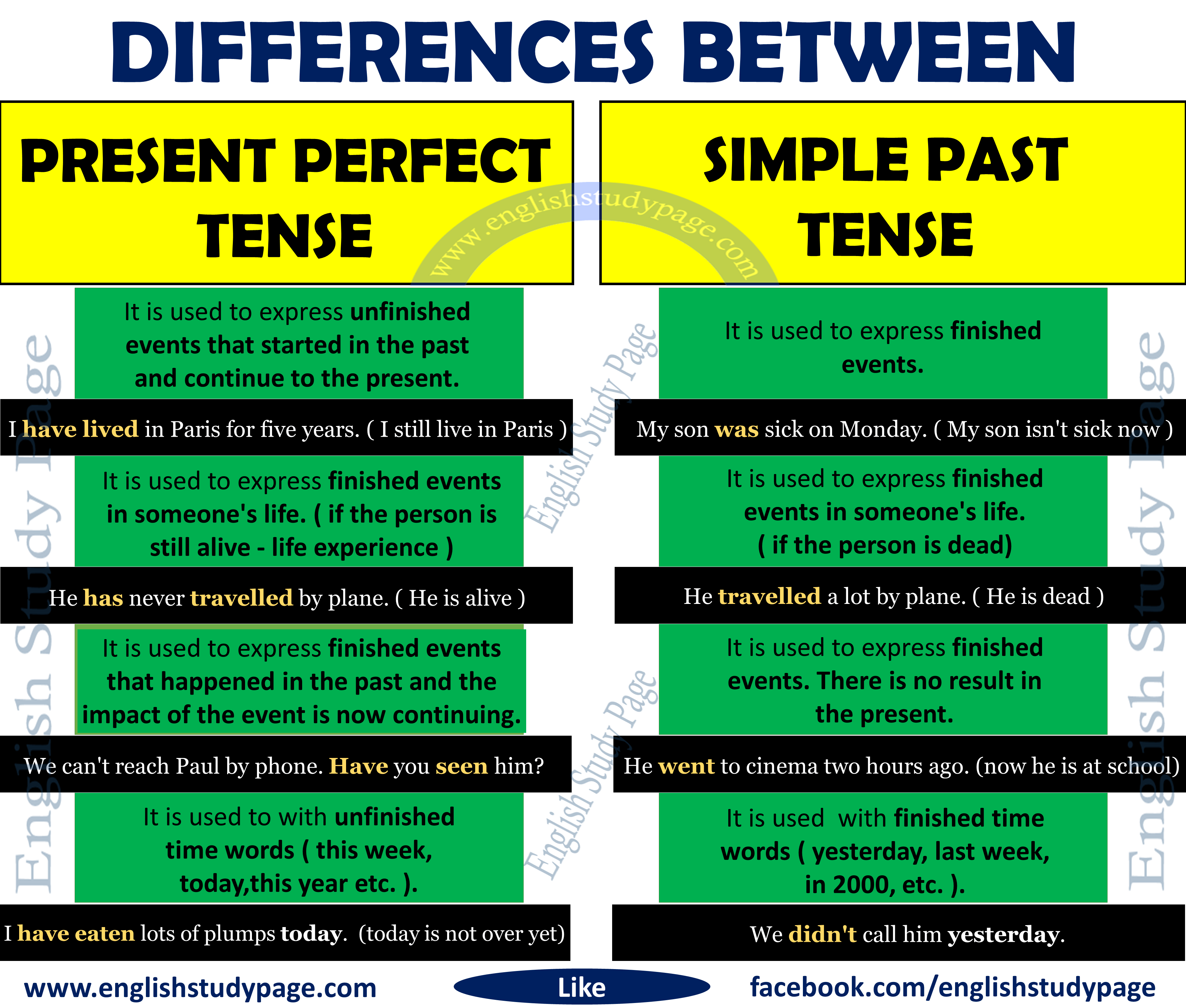



Differences Between Present Perfect Tense And Simple Past Tense English Study Page




10 Sentences Of Present Perfect Past Perfect And Future Perfect Tense English Study Here




Structure Of Present Perfect Tense Present Perfect Tense Rules And Examples English Grammar Youtube



1




The Present Perfect Tense English Esl Worksheets For Distance Learning And Physical Classrooms
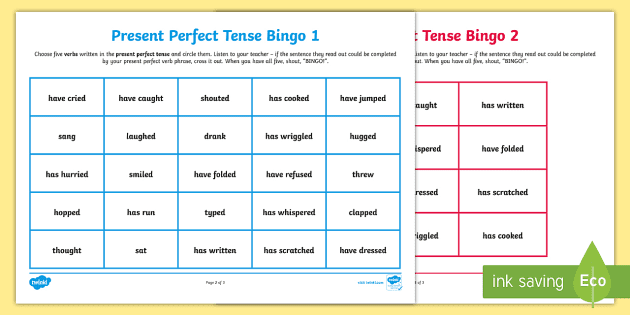



Present Perfect Tense Bingo
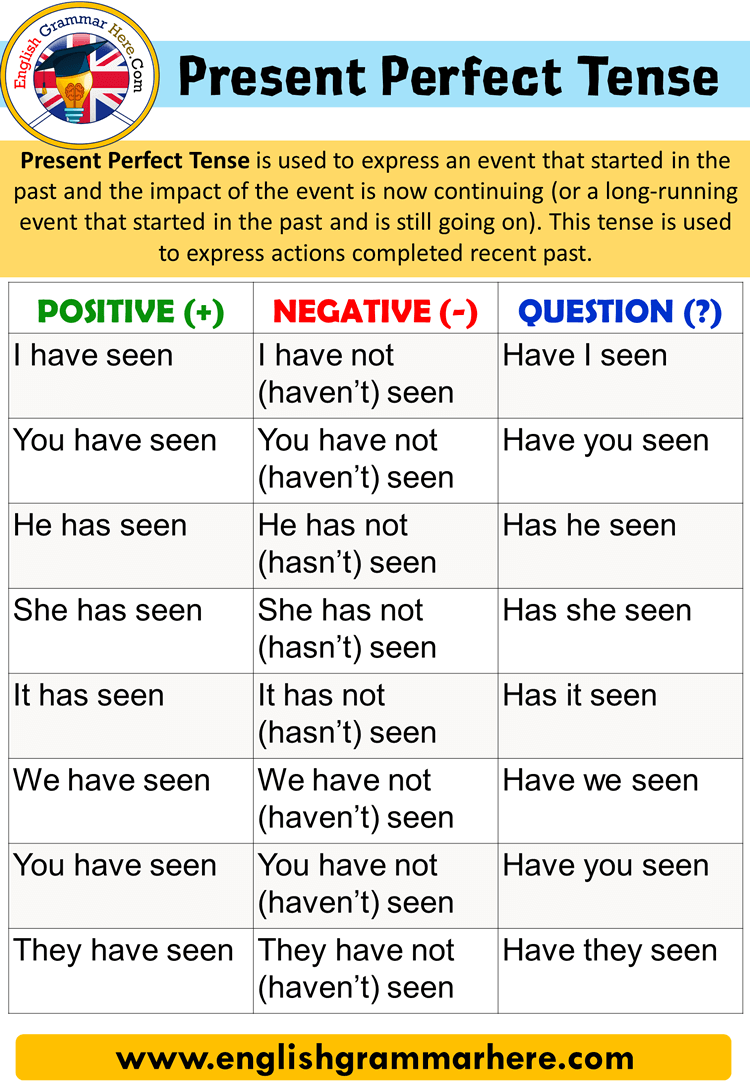



Present Perfect Tense Using And Examples English Grammar Here




Present Perfect Tense Video Lessons Examples Explanations
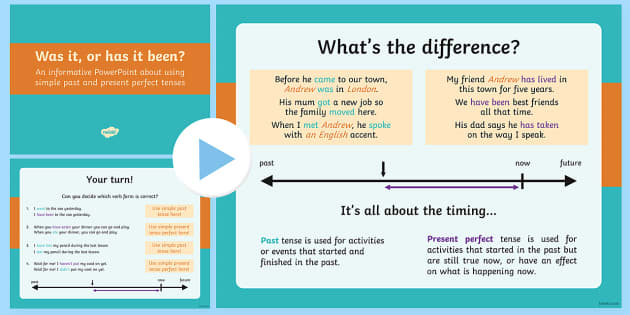



Present Perfect Tense Powerpoint Slides Primary Resources
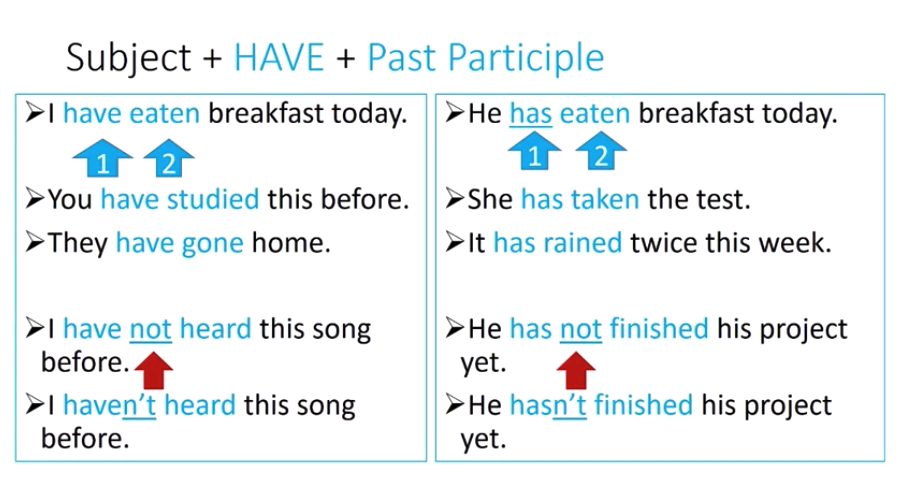



Present Perfect Tense Asean Scholarships




Present Perfect Tense Part 2 Use And Meaning Englishtutorhub
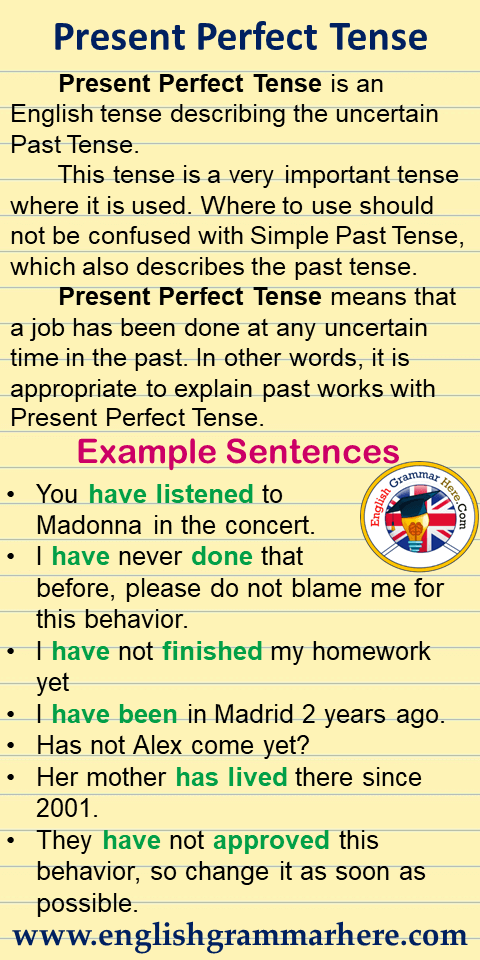



Present Perfect Tense Notes And Example Sentences English Grammar Here
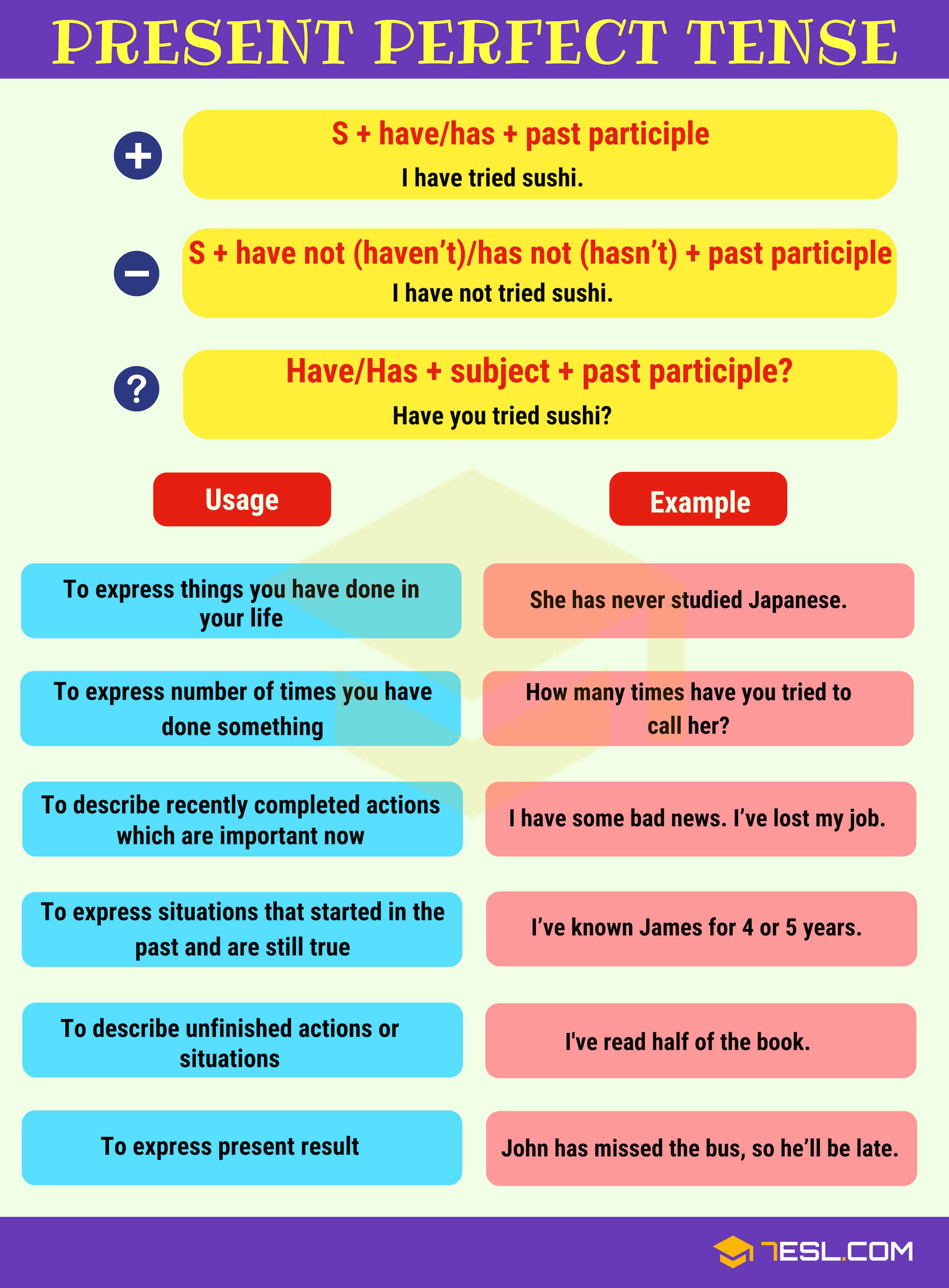



Easy English Grammar Verb Tenses Present Perfect Esl Elt Brain Perks




Using The Present Perfect Tense In English




Examples Of Present Perfect Tense Or Sentences Onlymyenglish
(143).jpg)



Present Perfect Tense Quiz Questions Proprofs Quiz



0 件のコメント:
コメントを投稿